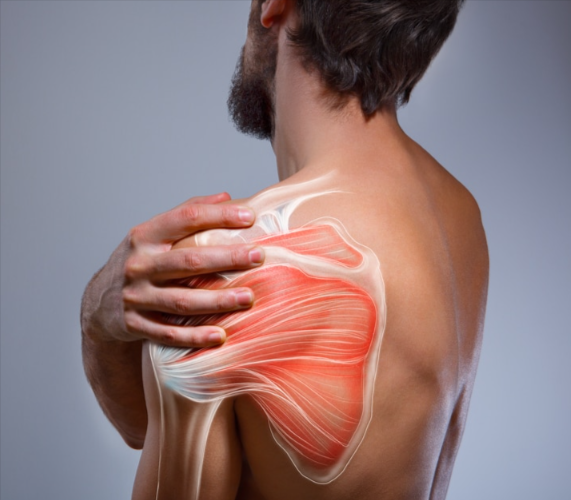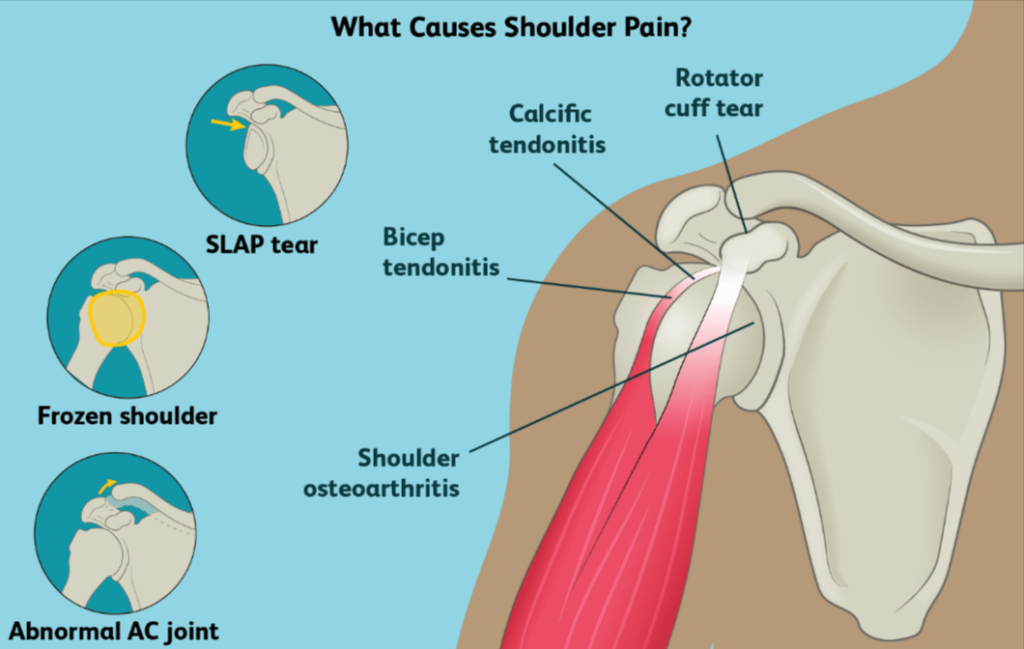What is Shoulder Pain?
Shoulder pain can arise from a wide range of causes, from minor strains to more serious injuries. The shoulder is a complex joint that allows for a high degree of mobility, but its complexity also makes it vulnerable to injury. Pain in the shoulder can limit everyday activities like reaching, lifting, and even sleeping comfortably.
If you are searching for an experienced McHenry physical therapy clinic near you for shoulder pain treatment, contact the top-rated physical therapists at Red Rock Physical Therapy & Wellness at 815-451-4502 for a consultation.
Jump to A Section
What Are Common Causes of Shoulder Pain?
Shoulder pain can be caused by a variety of issues. Some of the most common types of shoulder pain can be caused by:
- Overuse or repetitive strain from sports or work activities
- Poor posture
- Trauma from accidents or falls
- Inflammation due to conditions like tendinitis or bursitis
- Degenerative conditions like osteoarthritis
- Structural issues such as impingement or rotator cuff tears
Negative Effects of Shoulder Pain

Shoulder pain can significantly impact your daily life, making even simple tasks difficult to perform. It can interfere with your ability to move freely and carry out routine activities, potentially leading to more serious issues if left untreated. Over time, unresolved shoulder pain can affect your overall well-being, limiting your physical activity and reducing your quality of life. Addressing shoulder pain early is key to preventing further complications and promoting long-term health.
If untreated, shoulder pain can lead to:
- Reduced range of motion
- Chronic pain and discomfort
- Weakness in the shoulder and arm
- Inability to perform everyday tasks
- Sleep disturbances due to discomfort
In some cases, chronic shoulder issues can lead to compensatory injuries in other parts of the body, such as the neck or back, as you try to protect or minimize the use of the shoulder.
Common Symptoms of a Shoulder Injury
Shoulder injuries can present with a variety of symptoms, ranging from mild discomfort to severe pain. Common signs include:
- Pain, especially when moving the arm
- Stiffness or limited range of motion
- Weakness in the shoulder or arm
- Swelling or tenderness in the shoulder area
- Clicking or popping sensations during movement
- Radiating pain down the arm
Most Common Shoulder Injuries
Shoulder injuries are often the result of overuse, trauma, or wear and tear on the joint. They can affect the muscles, tendons, ligaments, or bones in the shoulder, leading to pain, stiffness, and reduced mobility. Common injuries involve inflammation, tears, or impingements in the soft tissues, which can make everyday movements, such as lifting or reaching, painful and difficult. These injuries are frequently seen in athletes or individuals with physically demanding jobs, but can also occur due to poor posture or repetitive motions over time.
Some of the most common shoulder injuries are:
- Rotator cuff injuries: Tears or inflammation in the muscles and tendons that support shoulder movement.
- Shoulder impingement: When the shoulder blade puts pressure on the underlying soft tissues during movement.
- Frozen shoulder (adhesive capsulitis): Stiffness and pain in the shoulder joint.
- Shoulder dislocations: When the head of the upper arm bone is forced out of the shoulder socket.
- Tendinitis: Inflammation of the tendons in the shoulder, often due to overuse.
How Do You Know You Have a Shoulder Injury?

If you experience persistent pain, reduced range of motion, or weakness in your shoulder, you may have a shoulder injury. A healthcare provider can diagnose the issue through a physical examination and, in some cases, imaging tests like X-rays or MRIs. Persistent symptoms following an injury or strain should always be evaluated by a professional to prevent worsening.
Treatment for Shoulder Pain
Treatment options for shoulder pain include rest, ice or heat therapy, anti-inflammatory medications, and physical therapy exercises. In more severe cases, corticosteroid injections or surgery may be required. Physical therapy is a key part of recovery, helping to restore mobility, reduce pain, and strengthen the muscles around the shoulder.
Physical Therapy Exercises for Shoulder Pain

Debbie Mitchell, our lead physical therapist, recommends the following physical therapy exercises for shoulder pain. These exercises are designed to strengthen the shoulder muscles, improve mobility, and promote healing:
Pendulum Swings
- How to do it: Stand and bend at the waist, letting the affected arm hang down. Gently swing your arm in a small circular motion. Repeat for 30 seconds in each direction.
- Benefits: Helps increase shoulder mobility without putting too much strain on the joint.
Shoulder Blade Squeezes
- How to do it: Sit or stand up straight. Gently squeeze your shoulder blades together, hold for 5 seconds, and then release. Repeat 10-15 times.
- Benefits: Strengthens the muscles that stabilize the shoulder and improves posture.
Wall Walks
- How to do it: Stand facing a wall. Slowly “walk” your fingers up the wall as far as you comfortably can, then walk them back down. Repeat 10 times.
- Benefits: Increases range of motion in the shoulder joint.
Crossover Arm Stretch
- How to do it: While standing or sitting, bring your affected arm across your body and hold it with your opposite hand. Hold for 15-30 seconds. Repeat 3 times.
- Benefits: Stretches the muscles in the back of the shoulder, improving flexibility.
External Rotation With Resistance Band
- How to do it: Attach a resistance band to a stable object. Hold the other end with the affected arm at your side, elbow bent at 90 degrees. Slowly rotate your arm outward, keeping your elbow close to your body. Return to the starting position. Repeat 10-15 times.
- Benefits: Strengthens the rotator cuff and improves shoulder stability.
Internal Rotation With Resistance Band
- How to do it: Similar to external rotation, but this time rotate your arm inward against the resistance of the band. Repeat 10-15 times.
- Benefits: Strengthens the internal rotator muscles, which are crucial for shoulder stability.
Sleeper Stretch
- How to do it: Lie on your affected side with your arm out at a 90-degree angle. Use your opposite hand to gently push your forearm toward the floor. Hold for 20-30 seconds.
- Benefits: Stretches the posterior capsule of the shoulder, relieving tightness.
Scapular Retraction With Resistance Band
- How to do it: Hold a resistance band with both hands and extend your arms in front of you. Pull the band apart, squeezing your shoulder blades together. Repeat 10-15 times.
- Benefits: Strengthens the upper back muscles, which support shoulder function.
Doorway Chest Stretch
- How to do it: Stand in a doorway with your arms out to the sides, holding the sides of the frame. Step forward to feel a stretch across your chest. Hold for 15-30 seconds.
- Benefits: Stretches the chest muscles, which can help improve posture and reduce shoulder strain.
Arm Circles
- How to do it: Stand with your arms extended out to the sides. Slowly make small circles with your arms, gradually increasing the size of the circles. Repeat for 30 seconds in each direction.
- Benefits: Improves shoulder mobility and warms up the shoulder muscles.
How Long Will It Take to Recover from a Shoulder Injury?

Recovery time from a shoulder injury depends on the severity of the injury. Minor strains may heal within a few weeks, while more severe injuries, such as rotator cuff tears, can take several months to fully recover. Debbie’s personalized physical therapy programs focus on helping patients regain strength and mobility as quickly as possible while preventing future injury.
What to Avoid if You Have Shoulder Pain
When dealing with shoulder pain, it’s important to be mindful of activities that could worsen your condition. Certain movements and habits can put additional strain on the shoulder joint, leading to increased discomfort and potentially prolonging the healing process. Avoiding actions that exacerbate pain or stress in the shoulder will help protect the joint and allow for more effective recovery. Engaging in the wrong activities can not only delay healing but also increase the risk of further injury.
Here are some things to avoid if you have a shoulder injury:
- Avoid overhead activities that cause pain, such as lifting or reaching.
- Don’t engage in activities that require repetitive shoulder movements, especially if they involve heavy weights.
- Refrain from sleeping on the affected shoulder, as this can increase pain and stiffness.
When Should I Seek Physical Therapy After a Shoulder Injury?
If shoulder pain persists for more than a few days, or if you notice weakness, reduced range of motion, or swelling, it’s important to seek professional evaluation. Physical therapy can help you regain full function, reduce pain, and strengthen the shoulder to prevent future injuries. Debbie recommends starting physical therapy as soon as your healthcare provider advises, as early intervention can speed up recovery and prevent complications.
Contact an Experienced McHenry Physical Therapist for Shoulder Pain Treatment Near You
If you are searching for an experienced McHenry physical therapy clinic for shoulder pain treatment, contact the top-rated physical therapists at Red Rock Physical Therapy & Wellness at 815-451-4502 for a consultation.
Debbie is a highly experienced and qualified physical therapist with over 20 years of experience in chronic pain management, sports rehabilitation, and advanced manual therapy. She runs a successful clinic in McHenry, Illinois, where she offers compassionate, expert care to help her patients recover and thrive.

